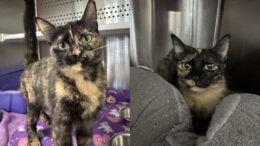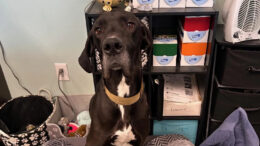The surge of patients being admitted to the UPMC Northwest hospital in Seneca because of COVID-19 infections is relentless.
Despite the soaring numbers, though, the local hospital is dealing with the busyness by keeping a keen focus on managing the situation with adequate staff, sufficient supplies, expansion of patient rooms and more.
So far, it’s been successful.
Privacy restrictions do not permit the hospital to publicly list its number of COVID patients, but a UPMC system representative reported last week there were 30 COVID inpatients at UPMC Northwest. That number dropped to 25 on Thursday.
The 170-bed UPMC Northwest hospital is part of the 40-hospital, Pittsburgh-based UPMC network. Brian Durniok is president of UPMC Northwest and Robin Melvin is chief nursing officer and vice president of patient care services
The duo carved out 30 minutes in what is a hectic daily schedule for an interview with the newspaper.
“In the last 24 hours, we’ve seen a fair amount of discharges and that has given us some relief in the building,” Durniok said Thursday. “But, prior to that, we’ve been extremely busy for three or four weeks straight.”
As to capacity, the local hospital has been very close to that level but administrators have taken steps to expand the number of inpatient rooms.
“We’ve actually taken some areas that included a closed unit and made it into a COVID unit,” said Melvin. “And, we’ve taken some of our private rooms and made them semi-private when we had to. We can flex our capacity when we need to and, in the last two weeks, we had to do that.”
Individuals needing admittance to the hospital for any illness or injury haven’t been turned away, said Melvin.
Anyone who needs hospitalization will continue to have access to UPMC Northwest even as more COVID inpatients are at the hospital.
“No, we are not turning away anyone. We have not physically said, ‘sorry, you can’t come.’ Yes, sometimes there are waits for beds when a person is in the emergency department and it gets slammed. But we get them upstairs to a room,” said Melvin.
Elective surgeries, postponed last spring when COVID first flared across the U.S., were later reinstituted and are still on tap.
“We’re doing those. We had to balance the surgery schedule, try to shift some things around so that the surgeries are more evenly distributed so we can maximize the space utilization,” said Durniok. “So we haven’t postponed them as much as move them around within the same week.”
Staff is stretched thin
Many hospitals across the nation are facing severe staffing shortages due to a spike in patients. At UPMC Northwest, adequate staffing hasn’t presented a problem.
“Whether we have an issue depends on where our (patient) census lies,” said Melvin. “If we are flexing and opening overflow units and rooms, that stretches our staff very thin. But they have been incredibly supportive of each other, working overtime, covering other shifts. It’s hard because they have home commitments with their kids not in school. Even on their days off, they are giving back to the community – that’s the reason they went into nursing.”
Durniok said all areas of staffing are being tapped to step up to ensure a full complement of hospital workers.
“We have our full-time staff, flex full-time, part-time and casual and all those categories have picked up additional hours in order to help us deal with the greatly increased census,” he said. “They are dealing with all the other things like virtual school and their kids at home so we are so appreciative of all the balls they are balancing. There are a lot of challenges right now and, out of the selflessness of our staff, we have risen to the occasion. We couldn’t be more proud of these people.”
To date, the UPMC Northwest healthcare workers have stayed relatively healthy and on the job.
Melvin said some staff members have had COVID while others who were exposed to someone who had it have quarantined.
“It goes in spurts – some weeks we have several people off and other weeks we have no one on quarantine,” she said. “Many more are quarantined out of caution because we want to keep our patients safe and our staff safe.”
Following the guidelines
Those day-to-day issues, plus a host of other concerns, are addressed several times a day in what Durniok described as “a command center.”
“Every morning we get together at a command center which we opened up in the spring because of COVID and then started back up again in the fall,” he said. “It pulls in a host of people from all disciplines and we check where we are that day as to patients, equipment, surgeries. We do a game plan every morning and reconnect later in the afternoon. So we are managing this every day and multiple times a day.”
Despite the health sector’s call for mask-wearing, social distancing, hand-washing and other measures aimed at mitigating the virus spread, the levels of infection, hospitalizations and deaths are rising everywhere, including in this region.
For Durniok and Melvin, the reason for the spikes relates directly to people not following the mitigation guidance.
“While a majority of people are wearing masks, not all are. This is a situation where people have the opportunity to make a difference by doing the right things,” said Melvin.
Durniok said be believes following the directives will slow the positive transmission rate.
“As long as there is inconsistency, the transmission exists,” he said. “We are optimistic because the vaccine will come out sooner rather than later. But, the greatest thing that would really help our community, our families, our health care workers is consistent masking. The virus … is very sneaky and subtle and we are dealing with the results of that.”
Vaccine is coming
UPMC Northwest is on target to receive the COVID vaccine soon.
“We’re hoping in the near future, perhaps before the end of the month,” said Melvin. “The UPMC system has a plan for vaccination and it will be done in different ways. Health care workers will be in the first wave and then they will follow a methodical approach as to how it will be given out.”
Durniok said he is unsure where the vaccinations will be available locally.
“The Department of Health is instrumental in the distribution. I would expect there will be opportunities to receive the vaccine locally in multiple venues. We are slated to get the vaccine doses for our health care providers but we’ve not seen additional information beyond that about a community plan,” he said.
Hopeful that “media attention and communication” across the nation will convince people to take the necessary precautions, Durniok said he is unsure whether COVID cases will continue to climb here.
“We honestly don’t know. The reality is that there is not an instantaneous understanding of what is occurring today so we won’t know the effects of today’s behavior as to the number of cases down the road. We hope, though, people are doing the right thing,” he said.
For Melvin, there are practices in plan to mitigate the spread.
“Whether it will get worse is hard to say because it seems to wax and wane,” she said. “We have so many people who ask what they can do to help health care providers. Here’s what you can do: you stay home, social distance, wear masks and wash your hands. The only way is to pull together and do the right thing.”
‘It is so humbling’
While bed capacity has been expanded, new protocols put in place to enable the treatment of a growing patient census and more, UPMC Northwest’s success is pinned squarely on the staff, said Durniok.
“The commitment of our staff has not changed. It’s not just our nurses and clinical staff but everyone, every single staff member, who is working long hours,” Durniok said. “While we’re tired and this work is harsh, we will all do the right thing for our community. It is so humbling to be part of this team,” he added.
For Melvin, who has a master’s degree in nursing and 33 years in the nursing field, the UPMC Northwest nursing staff is a major part of “our health care heroes” cadre.
“They are resilient – they go home after a 12- or 16-hour shift and come back the next day with a smile on their face and willing to help wherever they can,” said Melvin. “They are supporting each other and taking excellent care of our patients. And they will continue to do that.”






































